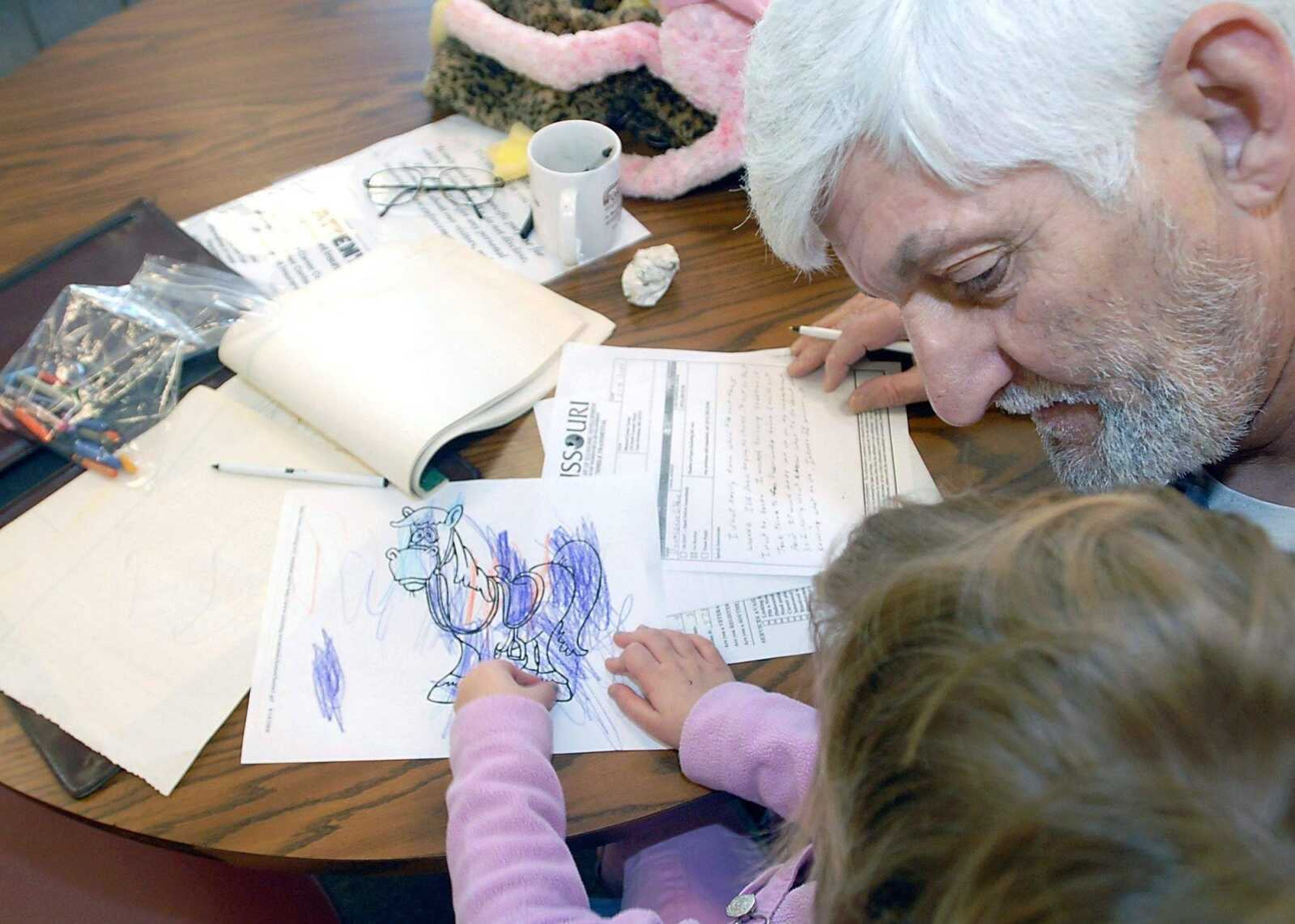Economic troubles make jobs scarce, put strain on aid organizations
Finding a job is tough. Finding a job that pays enough to support a growing family is even tougher. On Friday, John and Rebecca Ramos of Marble Hill, Mo., left their two children, 3 months and 19 months old, with a baby sitter and spent part of the morning at the Division of Workforce Development's Career Center in the Marquette Building on Broadway in Cape Girardeau...
Finding a job is tough. Finding a job that pays enough to support a growing family is even tougher.
On Friday, John and Rebecca Ramos of Marble Hill, Mo., left their two children, 3 months and 19 months old, with a baby sitter and spent part of the morning at the Division of Workforce Development's Career Center in the Marquette Building on Broadway in Cape Girardeau.
Rebecca Ramos is looking for her first job since she worked at Ryan's Family Steakhouse before having her most recent child. John Ramos is trying to replace the job he had at a tire retailer until October, when he was told he would be let go because of slow sales.
"I'm trying to find anything that goes into my skills," John Ramos said as he scanned the job listings on the center's computer database. "I'm a laborer. I've done backbreaking work since I was 18. And I'm trying to get funding to get better skills. It is closed doors everywhere you ask."
To make ends meet, both Rebecca and John Ramos are willing to work. But they said they need to earn enough money to cover the cost of gas to commute to a job and pay for day care for the two children. "It takes two people to work to pay for maintenance, repairs and car insurance and to pay the local bills," Rebecca Ramos said. "You don't have any money left and you try to get assistance and you make too much for assistance."

The Ramoses are among hundreds of job seekers who are visiting the career center each week. From an average of 1,491 people per month from July to October, the center handled 2,209 visitors in December, and January doesn't appear to be slowing down, said Ashleigh Hope, work force development supervisor.
For some people, she said, finding a job is just a matter of diligence. For others -- as John Ramos has discovered -- the best advice she can give, she said, is to obtain new skills.
Hope's staff divides the duties for helping newly laid-off workers with the regional Workforce Investment Board and MERS/Goodwill, a contractor that provides evaluation and counseling services. The Workforce Investment Board sends out a "rapid response" team to employers. Employers must report when they lay off 50 or more workers; others request help when they are letting a smaller number go.
In the past six months, the board has sent the rapid response unit out 30 times. For some employers, like Thorngate and Rapco Manufacturing in Advance, Mo., the layoffs were caused, at least in part, by foreign competition and the workers are eligible for training aid through the Trade Readjustment Act. For others, the counselors work to evaluate their skills and find other avenues to help them pay for classes.
For some people, said Deann Briggs, director of MERS/Goodwill, retraining means going back to the basics -- GED classes, for example -- while for others it is a matter of updating old skills or obtaining certification for skills they possess.
"We may take in someone who worked in a clerical field years ago but then went into manufacturing," she said. "For them, we offer short-term training to attach them to a job as quickly as possible. If we can reattach them to the work force, to get them back to work in the quickest amount of time possible, that is the best."
The Cape Girardeau Area Career and Technology Center, the vocational school operated by the Cape Girardeau Public Schools on South Silver Springs Road, is taking a direct approach to marketing itself as a location to learn new skills. Compiled on a sheet with the headline "LAID OFF?," the center lists courses that take from a few weeks, such as keyboarding or basic computing, to those that take a few months, such as medical coding, small engine repair and business office skills.
The center has staff on hand to help prospective students get financial aid and fit the course offerings into their schedule, said Rich Payne, director of the center. The course listing for the short-term training are classes that were to be offered anyway, he said, but they are being highlighted because they provide an immediate effect for people out of work.
"At the end of the day, what those workers need to do to be more marketable is expand their skill sets," Payne said.
Longer-term training programs, such as culinary arts, nursing or respiratory therapy, for example, typically begin with the fall semester, Payne said. Those programs are difficult to change from their current format. And although demand is high -- there were 279 applicants for 48 slots in the nursing program -- the career center doesn't have the resources to expand them, Payne said.
"That is just the way we are set up," Payne said. "There is not a lot of flexibility."
But there is flexibility in the way the shorter term courses are offered, he said, and the career center is trying to provide as much help as possible.
Finding training and a job for the interim is the goal Jeremy Taylor, 35, has set for himself. He recently completed a rehabilitation program at the Gibson Center and wants to enroll in training as a certified nursing assistant, but he needs a job now to cover his bills. He gets food from the Salvation Army and volunteers there as a way of paying back a little of the help.
All he needs is a chance, Taylor said, but he's finding that the competition is fierce. "People who have worked at places for 20 years are now working at McDonald's," he said.
Donald Gibbons, meanwhile, just wants the construction field to pick up again. At 55, he's seen ups and downs, but the current recession is the first time he's ever filed for unemployment payments. Gibbons had granddaughter Abraina with him Friday when he visited the workforce development Career Center.
He's frustrated with the unemployment insurance system because instead of asking for benefits each week he is eligible, he has sought to stretch out the money by only making claims in weeks he needs money. As a result, he said, the automated system doesn't seem to work well for him.
Gibbons is a drywaller who made $15 an hour working for C&H Drywall in Chaffee, Mo., before being laid off.
"It is bad out," he said. "Usually in the fall time it slows down, but it shut down this year. This is the worst I have seen."
He's living frugally as he waits out the recession, Gibbons said. He canceled cable television service and eats a lot of homemade soup. "And I haven't had a beer in four months," he said. "I've got to have gas, and it is either gas or beer."
rkeller@semissourian.com
388-3642
Does this affect you?
Have a comment?
Log on to semissourian.com
Coming Tuesday: The high cost of keeping health insurance after a job loss.
Connect with the Southeast Missourian Newsroom:
For corrections to this story or other insights for the editor, click here. To submit a letter to the editor, click here. To learn about the Southeast Missourian’s AI Policy, click here.









